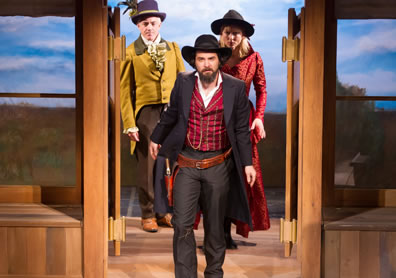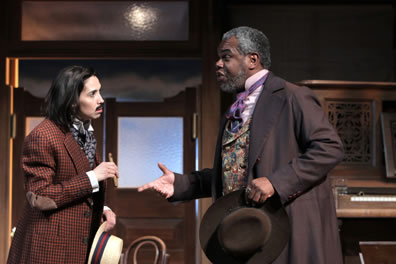The Taming of the Shrew
Unnecessary Script Doctoring Ill-Treats
An Ideal Setting and Comic Playing
Folger Theatre, Washington, D.C.
Sunday, May 6, 2012 (Seats F–13&15, left stalls)
Directed by Aaron Posner

Petruchio (Cody Nickell) leads Kate (Kate Eastwood Norris) and Grumio (Danny Scheie) into the Padua saloon in the Folger production of The Taming of the Shrew. Photo by Jeff Malet, The Folger.
Katherine as a Calamity Jane, Petruchio as a Wild Bill Hickock, Padua as a Deadwood. We’ve seen an American Old West concept for The Taming of the Shrew before—almost exactly one month before, in fact, by New York’s Theatre for a New Audience. In between, we also saw Synetic’s dance version of the play set in the American New West, i.e., Hollywood.
All told, I’ve seen this play a dozen times, and at least half of those have been set in a time and place other than 16th century Italy (or, rather, 16th century Warwickshire, England, which is where Shakespeare actually set his play). However, in my experience, directors are yet afraid to set Shrew in modern dress and still adhere to Shakespeare’s plot and dialogue (my take: This play could get a modern setting and remain true to the text and still be relevant while not at all insulting to one gender or the other). For directors seeking a new way to present the play, the Wild West of lore holds obvious potential: it was a patriarchal society where money and feistiness were the best avenues to power (and a combination of the two the surest means to power). That society’s near-lawless nature also suits the rough-and-tumble tone inherent in the play; after all, Kate hogties Bianca. In his director’s notes, Aaron Posner, who helmed this Folger production, was watching the TV series Deadwood when he was inspired to turn his Shrew into similarly mythologized American frontier town.
The concept itself holds great promise, even while maintaining the Italian town names of Padua, Mantua, Pisa, et al. (after all, these towns don’t exist in Shakespeare’s Warwickshire home, either). However, this or any setting for The Taming of the Shrew reaches its full potential only when it is used to bring out Shakespeare’s psychological study of women negotiating a five-card stud society but dealt only three cards. That doesn’t happen in this Folger production. Posner’s textual interpolatioss and cuts, plus some inconsistencies in the playing, gloss over Shakespeare’s keenly drawn women and his unapologetic portrayal of interrelationship dynamics so that even with its Wild West setting we get a surprisingly too-tame shrew.
Yes, Kate Eastwood Norris as Kate is a pants-wearing, gun-toting, middle-finger-pointing hellion at the start. But, she also displays a notable sweet streak from the beginning; she alone gives money to the Blind Balladeer (Cliff Eberhardt—more on him later), and she shows genuine concern for the feelings of the servants, the tailor, and the haberdasher. Norris sometimes plays Kate as more confused than contrary, and as she goes from one ah-hah! moment to another, it’s not clear what discoveries she has arrived at about herself—if any. The key lesson in this production seems to be one of learning to play Petruchio’s game instead of learning the value of mutual respect, gratitude, and trust that courses through Shakespeare’s portrayals.
Indeed, in Posner's most troubling textual manipulation, this production turns upside down the moment when Kate fully realizes the meaning to Petruchio’s methods and earns an immediate reward as a result. After the moon-or-sun debate, it is Posner’s Kate rather than Shakespeare’s Petruchio who greets Vincentio (a fittingly fatherly David Gamble) as a fair lovely mistress. She then gets Petruchio (Cody Nickell) to go along with the joke. Kate still gets the payoff—Vincentio is the first character in the whole play other than Petruchio to pay her a compliment—but the lesson in trust is muddied. Posner’s reversing Shakespeare’s dialogue here has no clear purpose other than a reach for some additional laughs; rather, it comes across as a director who has lost interest in Shakespeare’s play, and the rest of the proceedings move along at a "let's-get-it-over-with" pace, except for Kate’s final speech.
That’s thanks to Norris. Give her, a top-tier Shakespearean actress, a gem like Kate’s final act testament to duty and you’ll discover brilliant facets emerging through her polished rendering. As the speech opens with the line “Fie, fie! Unknit that threat’ning unkind brow,” Norris’ Kate sees this look on the widow (Katy Carkuff), and she uses it as the start of a train of thought on which all the rest logically follows. She also emphasizes that duty is owed to a husband’s “honest will,” and it’s clear from her gesture and Petruchio’s assenting reaction that the husband’s integrity is a cornerstone in the speech’s philosophical foundation.
Nickell is a fun Petruchio, an image-driven gunslinger who falls for Kate at first sight. Their first showdown is set up with a tension-building rhythmic soundtrack the Balladeer plucks on his guitar (more on him later), but rather than drawing guns they fire insults in the OK Corral shootout of wits. He matches her spirit, he engages her in a barroom brawl, he overwhelms her with antic kindness. However, after abusing the tailor and haberdasher, and after telling Kate “’Tis the mind that makes the body rich,” Petruchio presents her a new pair of pants, beautiful riding coat, spurs, and cowboy hat (Petruchio’s gift to Kate is another of costume designer Helen Q. Huang’s visual gifts to the audience, outfitting her Padua residents in colorful, extravagantly patterned post–Civil War long coats, vests, and dresses). This non-Shakespearean moment hammers home the feminist countermoral of Shakespeare’s story, that the husband should accept and respect his wife as who she truly is. But Shakespeare has Petruchio doing so at their first meeting; all the continuing brawling in the interim is his attempt to get Kate to likewise accept and respect others as they are. In this production, Kate starts with that premise from the opening tableaux.
Ironically, though the mythical Wild West was a patriarchal society, it is a matriarch who rules this Padua: Baptista Minola, a wealthy businesswoman played by Sarah Marshall. Though the device of changing Baptista from the father into the mother of Kate and Bianca is totally un-Shakespearean, what a treat to watch the marvelous Marshall as a tiny, elderly lady who suddenly becomes a homesteading-strong spitfire roaring out her lines and wielding a rifle (which somehow just magically appears in her capable hands). As Kate obviously inherited her own shrewish spirit from her mom, it's not obvious why everybody doesn't show the daughter the same respect as the mother. As for Bianca (Sarah Mollo-Christensen), who Senora Baptista treats just as sternly as she does Kate, there is no hint of even a clandestine shrewishness. This Bianca is merely a sweet, ladylike counterpoint to the cowboy Kate.

Holly Twyford playing Tranio as Lucentio (left) talks with Craig Wallace's Gremio in The Taming of the Shrew at the Folger. In this production, Tranio was a woman, heightening the effect of her disguise as Lucentio, and Wallace captured Gremio's cultural ignorance in his Old West portrayal. Photo by Carol Pratt, The Folger.
Posner also switched the gender for Tranio, Lucentio’s trusty servant. The upside is it allowed him to cast the incomparable Holly Twyford in such a key role, and this woman playing a gallant, cigar-smoking gambler version of Lucentio is inspired work. Where this device goes astray is having Tranio crush on Lucentio (the debonair Thomas Keegan). This seems something of a D.C. theater trend, as across town the recently opened Faction of Fools Hamlecchino, The Clown Prince of Denmark casts Horatio as a woman pining for Hamlet. Is this really the sad lot of good women? Or maybe it is a prevailing male fantasy, to be so loved by a woman she’ll help you obtain the sex object of your dreams: a best friend and benefits without the emotional undertow of having both in one. I can’t recall such a line of thinking in Shakespeare, except Helen in All's Well That Ends Well: she dotes on a man who doesn't love her and helps him to his sexual conquest, but tricks him into bedding her instead. I think Shakespeare had keener insight into women than most men do.
Along with Twyford and Marshall, the highlight performances of this production were turned in by the two a-mios. Danny Scheie played Grumio, Petruchio’s servant, as a dandy. Slowing down Grumio’s lines and clipping them off with an affectedly persecuted tone made his speeches funnier than they seemingly merit on the page. In playing Gremio, the wealthy old landowner courting Bianca, Craig Wallace expertly turned Shakespeare’s lines into a frontier dialect. Just listening to Wallace’s Gremio describe Cambio as “well read in poetry, and other books, good ones, I warrant ye” in his uncultured attempt at being cultured was not only funny, it was a clinic in fitting Shakespeare’s verse to a topical character.
Thanks to the capable cast Posner has corralled for this rambunctiously played comedy, the laughs pass through his Padua like a buffalo stampede. Among the finest contributions to the production are those from singer-songwriter Eberhardt as the Blind Balladeer. He occupies a corner of set designer Tony Cisek’s saloon from start to finish, playing musical interludes (which he wrote specifically for this production) on guitars and upright piano. The songs are both poignant and funny, the music both topical and contemporary, and the soundtrack, thankfully, is for sale at the Folger gift shop.
This is the kind of outside-Shakespeare’s-box thinking—like Posner's use of masks in The Two Gentlemen of Verona, puppets in Measure for Measure, and a faux drama society in The Comedy of Errors—that makes him one of our generation’s most dynamic presenters of The Bard’s work. His misfire with The Taming of the Shrew is because he didn’t trust that Shakespeare had, in fact, written the perfect script for his Wild West show.
Eric Minton
May 9, 2012
This review also appears on PlayShakespeare.com
Comment: e-mail [email protected]
Start a discussion in the Bardroom



 Find additional Shakespeareances
Find additional Shakespeareances